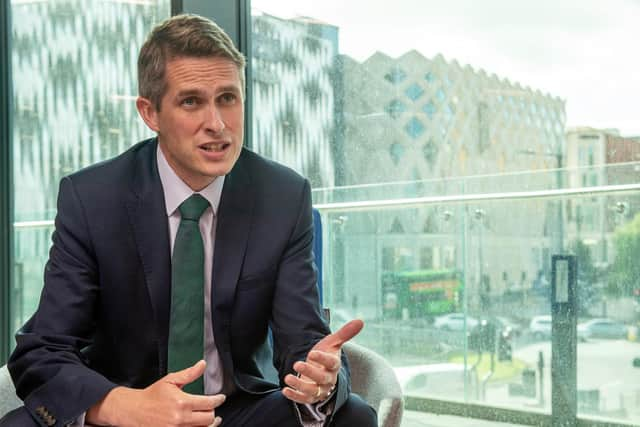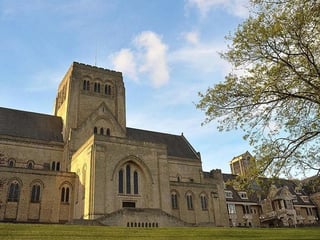'Overwhelming majority' of primary schools to reopen on January 4, says Gavin Williamson
Mr Williamson told the Commons the Government must make an "immediate adjustment" to its plans to reopen all schools in January but that it must do all it can to keep children in school.
The "overwhelming majority" of primary schools will reopen as planned on January 4, but in a small number of areas where infection rates are high only vulnerable children and children of key workers will return.
Advertisement
Hide AdAdvertisement
Hide AdHe did not immediately specify which areas would not see primary schools reopen, but Yorkshire and the Humber has seen coronavirus infection rates lower than London and the South East.
All pupils in exam years will return to secondary schools in England from January 11 while the rest of secondary and college students will go back full-time on January 18, Mr Williamson said in a U-turn on the planned reopening.
Mr Williamson said that testing will begin "in earnest" in January, with those in exam years at the head of the queue.
He told MPs: "All pupils in exam years are to return during the week beginning January 11 with all secondary school and college students returning full time on January 18.


Advertisement
Hide AdAdvertisement
Hide Ad"During the first week of term on or after January 4, secondary schools and colleges will prepare to test as many staff and students as possible and will only be open to vulnerable children and children of key workers.
"The 1,500 military personnel committed to supporting schools and colleges will remain on task providing virtual training and advice on establishing the testing process with teams on standby to provide in-person support if required by schools.
"Testing will then begin the following week in earnest with those who are in exam years at the head of the queue. This is in preparation for the full return of all pupils in all year groups on January 18 in most areas."
In a statement, he said: "We must always act swiftly when circumstances change. The evidence about the new Covid variant and rising infection rates have required some immediate adjustment to our plans for the new term."
Advertisement
Hide AdAdvertisement
Hide AdHe added: "The latest study we have from Public Health England is that Covid infections among children are triggered by changes in the community rate. The study also says that the wider impact of school closures on children's development would be significant. I'm quite clear that we must continue to do all we can to keep children in school."
Shadow minister for schools Wes Streeting tweeted: "The first thing that parents will be doing following this statement is looking online to see if their schools are open.
"The list isn't yet online. For crying out loud."
There has been growing concern from teaching unions and scientists about the spread of the virus following the discovery of its much more transmissible variant.
A YouGov poll conducted overnight suggested that 43 per cent of 7,999 British adults surveyed would "strongly support" keeping schools in England closed for two further weeks after the Christmas break.
Advertisement
Hide AdAdvertisement
Hide AdJust nine per cent "strongly oppose" and 10 per cent "somewhat oppose" keeping school gates shut, YouGov said.
Health Secretary Matt Hancock said the aim is to "protect education as much as possible" but acknowledged the challenge posed by the new variant.
He told BBC Radio 4's Today programme: "The Education Secretary will be setting out his proposals later today. Clearly we want to protect education as much as possible.
"But the new variant does make it much easier for this disease to transmit. So we are going to protect education as much as we can."
Advertisement
Hide AdAdvertisement
Hide AdBoris Johnson was due to chair a key meeting looking at delaying the reopening of secondary schools, according to the Daily Telegraph.
Henri Murison, director of the Northern Powerhouse Partnership, said: “While it’s clear that, pre-Christmas, school attendance across the whole of the UK was beginning to drop in line with many parts of the North, it’s worth remembering that Northern pupils had already lost weeks and weeks of learning. There are GCSE students in Oldham who had had just six weeks of face-to-face teaching this academic year.
“Existing disparities between disadvantaged children and their wealthier counterparts have been compounded by the digital divide and months spent at home.
“Assessment must take these factors into account. Those preparing to take exams are at risk of paying a heavy price if we get this wrong.”
Advertisement
Hide AdAdvertisement
Hide AdLabour had called for Mr Williamson to make a statement to MPs on the plan for schools and colleges, with shadow education secretary Kate Green saying "staff and pupils are crying out for clarity about the start of term next week". She added: "Silence from Government is not an option."
Earlier this month, the Government said exam-year students would go back to school as normal after the Christmas holidays, but the majority of secondary school pupils would start the term online to allow headteachers to roll out mass testing of children and staff.
London mayor Sadiq Khan said he did not want to see education of children disrupted, but due to the worsening situation in hospitals he called on ministers to "delay the reopening of secondary schools for in-person learning for most children until later in January".
Professor Neil Ferguson, a member of the Government's New and Emerging Respiratory Virus Threats Advisory Group (Nervtag), said schools staying shut may be "required" if it was "the only alternative to having exponentially growing numbers of hospitalisations".
Advertisement
Hide AdAdvertisement
Hide AdScientific Advisory Group for Emergencies (Sage) members Professor Andrew Hayward and Dr Mike Tildesley have also suggested a possible "slight delay" to having pupils back on site.
Professor Russell Viner, president of the Royal College of Paediatrics and Child Health, said schools "should be the last places to close".
He called for an "ambitious, national and properly funded recovery plan" for children and young people which he described as "especially vital" if schools remain partially or fully closed in the early part of the year.
But Professor Susan Michie, a member of Spi-B - a sub-committee of Sage - and also a member of Independent Sage, said January should be used to "make schools safe" with improved ventilation, free masks and multiple sanitiser stations.
Advertisement
Hide AdAdvertisement
Hide AdShe said during this time online teaching should be offered for most children, other than those who are vulnerable, those of key workers and those who cannot be taught at home for other reasons.
She said: "To achieve this plan, we need an immediate Government task force, which includes the teaching unions, local authorities, governing bodies, and parents, even children, to implement this plan."
The Prime Minister's official spokesman told a Westminster briefing on Tuesday that they were "still planning for a staggered opening of schools and we are working to ensure testing is in place". But he added that all measures are being kept "under constant review".
The staggered approach would see primary school pupils and Year 11 and Year 13 pupils returning in the first week of January, and other students going back later in the month.
Meanwhile, with the approval of the Oxford/AstraZeneca vaccine, a union has reiterated its call for school and college staff to have priority when it comes to getting the jab.
Comment Guidelines
National World encourages reader discussion on our stories. User feedback, insights and back-and-forth exchanges add a rich layer of context to reporting. Please review our Community Guidelines before commenting.
